 A sexy, geeky female superhero? The concept has possibilities, but Tim and Mulele find some problems with Sam Johnson’s Geek Girl…
A sexy, geeky female superhero? The concept has possibilities, but Tim and Mulele find some problems with Sam Johnson’s Geek Girl…
Podcast: Play in new window | Download
 A sexy, geeky female superhero? The concept has possibilities, but Tim and Mulele find some problems with Sam Johnson’s Geek Girl…
A sexy, geeky female superhero? The concept has possibilities, but Tim and Mulele find some problems with Sam Johnson’s Geek Girl…
Podcast: Play in new window | Download
 We start the year off right with a critique of Irish creator Mark Egan’s comics statement about call centers, Back Office!
We start the year off right with a critique of Irish creator Mark Egan’s comics statement about call centers, Back Office!
Podcast: Play in new window | Download
 Two astronauts battle their own ship’s computer. Sound familiar? No, it’s not 2001: A Space Odyssey, it’s Lee Milewski’s”With the Earth Above Us“. Not unlike Kubrick’s movie, this one strikes Tim and Mulele as being a bit hard to follow…
Two astronauts battle their own ship’s computer. Sound familiar? No, it’s not 2001: A Space Odyssey, it’s Lee Milewski’s”With the Earth Above Us“. Not unlike Kubrick’s movie, this one strikes Tim and Mulele as being a bit hard to follow…
Podcast: Play in new window | Download
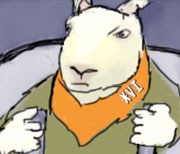 This week, the work of Nick Dupree. At New York Comicon, Mulele had hoped to meet Nick but didn’t get the chance. Nonetheless, we took a look at his imaginative, unusual comic Bunnies in Space, and here’s our critique…
This week, the work of Nick Dupree. At New York Comicon, Mulele had hoped to meet Nick but didn’t get the chance. Nonetheless, we took a look at his imaginative, unusual comic Bunnies in Space, and here’s our critique…
Podcast: Play in new window | Download
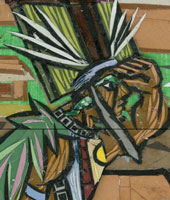
This week, a collection of cut paper comics, each one better than the last. We critique Monarch Monkey and Other Stories, by Brad DeRocher, Dan Mazur, and Hyun Supul.
Podcast: Play in new window | Download
 A lushly-drawn, colorful fantasy tale of a powerful mouse. What could possibly go wrong? Well, our recording software, for one thing! Tim and Mulele brave technical difficulties to critique J.D. Calderon’s The Oswald Chronicles.
A lushly-drawn, colorful fantasy tale of a powerful mouse. What could possibly go wrong? Well, our recording software, for one thing! Tim and Mulele brave technical difficulties to critique J.D. Calderon’s The Oswald Chronicles.
Podcast: Play in new window | Download
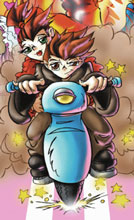 Benji Ratliffe sent us his four-year-old unpublished work Fashionable Nonsense for critique. It’s a somewhat supernatural tale with a Scott Pilgrim tone. He wrote the script and hired an artist. While it does indeed have some problems — with clarity of the story, as well as storytelling and inking — why not put it out anyway? Tim and Mulele extol the virtues of putting your work out, even if you’re not 100% satisfied with it.
Benji Ratliffe sent us his four-year-old unpublished work Fashionable Nonsense for critique. It’s a somewhat supernatural tale with a Scott Pilgrim tone. He wrote the script and hired an artist. While it does indeed have some problems — with clarity of the story, as well as storytelling and inking — why not put it out anyway? Tim and Mulele extol the virtues of putting your work out, even if you’re not 100% satisfied with it.
Podcast: Play in new window | Download

Mulele is back from New York Comicon! While he can’t talk about what might have transpired in terms of getting work (which is a whole lot better than saying “nothing happened”!), he has plenty to say about the experience of being there & his impressions of the comics industry, how his thoughts about it changed, and about New York, the city.
While at the con, he ran into Jordan Kotzebue, creator of Hominids, who Tim met at Emerald City 2011. Tim calls him up this week to catch up on his progress, including how our own critique of Hominids changed his approach to the comic.
Podcast: Play in new window | Download
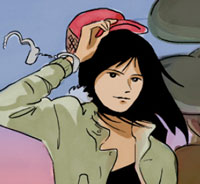 Tim and Mulele check out the smooth, sexy Peony Trivet #1, by Ed Greene and Jeff Sims.
Tim and Mulele check out the smooth, sexy Peony Trivet #1, by Ed Greene and Jeff Sims.
Podcast: Play in new window | Download
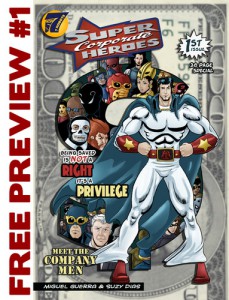 Super Corporate Heroes is a satirical comic that centers on a company called Superhero, Inc. This company is a Fortune 500 company that has superheroes who save people in exchange for money. Anyone who needs saved by the superheroes must pay these superheroes through rescue insurance. This rescue insurance is expensive. As a result of this expensive rescue insurance, only rich people have a better chance of being saved, while the poor people have less of a chance of being saved. Also, the superheroes with the stronger powers earn more money and the superheroes with lesser powers make less money. Super Corporate Heroes is the comic that made me think about what it really means to save people.
Super Corporate Heroes is a satirical comic that centers on a company called Superhero, Inc. This company is a Fortune 500 company that has superheroes who save people in exchange for money. Anyone who needs saved by the superheroes must pay these superheroes through rescue insurance. This rescue insurance is expensive. As a result of this expensive rescue insurance, only rich people have a better chance of being saved, while the poor people have less of a chance of being saved. Also, the superheroes with the stronger powers earn more money and the superheroes with lesser powers make less money. Super Corporate Heroes is the comic that made me think about what it really means to save people.
One of the superheroes who work for Superhero, Inc. is a mysterious hero called The Shroud. The secret mission he is on makes this hero a very weird guy. Another Superhero Inc. employee is American Icon, who is an indestructible playboy. American Icon earns the most money due to the fact that he is indestructible and is the most called on for help. There is also Ms. Titanium, who does a lot of work, but is under appreciated for her work. Superhero, Inc also has a veteran worker called Major America, who has been fighting crime for a very long time. Superhero, Inc. also has a worker who is the last of the Greek gods. This god is named Olympia. Finally, we have a superhero named Blue Collar. Blue Collar has a low salary due to the fact that he has to pay child support and alimony.
The Superhero, Inc. heroes are soon challenged by evil super villains, who begin to destroy New York City. This destruction of New York City sucks the workers of Superhero, Inc. into the super villains’ corruption.
Super Corporate Heroes is written and lettered by Suzy Dias. The artist is Miguel Guerra, who also co-writes the comic with Suzy Dias. The artwork is beautiful and is also sets the perfect mood for the mood of the comic. The coloring of the artwork has a perfect balance between gloomy and bright. This is good for a story that is satirical. The content of this comic is dark, but is expressed with humor.
The first issue shows a burning building on the first panel. The panel shows a man in a green shirt hanging off the building’s ledge. He is holding on for dear life and is about to fall to his death. He is yelling for help. There is so much smoke that no one can see him. As the man in the green shirt starts to give up, The Shroud shows and says, “looks like you could use some help.” As the man in the green shirt thanks God that The Shroud came to his rescue, The Shroud says to the man in the green shirt, “first I need to explain the terms of our contract before I can legally rescue you.”
According to Superhero, Inc. $1000 gets one 5 rescues for a month and $6000 covers one for a year. Once a person is saved, the superhero takes the saved person’s credit card. Then, the superhero swipes the credit card with a portable swipe machine. Then, the saved person is given a receipt. After that, the saved person is sent a button in the mail. The saved person has to wear this button to be saved again.
Both the people in danger and the superheroes are in rough situations in this story. The poor people in danger don’t want to be treated like villains just because they can’t afford to be saved. However, the superheroes want to make a living off of their talent and be able to have roofs over their heads and food on their tables. Super Corporate Heroes is an interesting comic book that will make you think and laugh.
You can view the first issue of Super Corporate Heroes for free at www.7robots.com/comics.